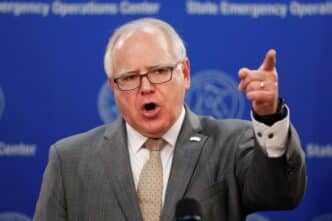As we approach the upcoming presidential election, it is very easy for Catholics to make a fundamental error. It is easy for us to imagine that there is a party or candidate that is the right choice for Catholic voters and that the morality of voting is about discerning that choice correctly and voting accordingly.
If this were the case, the Church’s reticence about instructing the faithful who to vote for can seem a kind of cowardice. If the morality of voting is about picking the right side, the Church should simply tell us which side that is.
It also implies that those Catholics who manage to make the right choice are somehow better Catholics than those who make another choice. This might be complicated by the fact that neither major option is very close at all to a Catholic worldview, but if voting really is about making the correct moral choice, the conclusion still stands: Voting in a certain way is a faithful Catholic thing to do and voting the other way is not.
A matter of prudential judgment
This is not how the Church thinks about voting. According to Church teaching, voting is a matter of prudential judgment. One thing that this means is that different people can very legitimately come to different conclusions. The most obvious reason for this is that judging who to vote for means taking an educated guess at a lot of factors that we can’t know with much certainty.
Two people with well-formed Catholic consciences might agree that combating poverty — or reducing abortion, or preserving democracy, or justice for migrants, or securing the border, the list could go on — is an important goal but differ on which policies are likely to be most effective in achieving that goal. And here’s the kicker: There’s no way to know for sure who is right. Such issues feature so many variables that predicting which policies will lead to which outcomes is a very imperfect science.
This means that voting requires a kind of humility. We must discern to the best of our ability which candidates and which policies are likely to net the best outcomes across a whole range of issues, but we need to acknowledge that the decision we make here is made in the half-light of conjecture. What is more, the decision we make is always a compromise. We might judge that, on balance, one party is better. That doesn’t mean they are always right and the other side is always wrong.
Being honest (with ourselves, first of all) that our information is imperfect and our decisions are a compromise is essential to combat the division that the Church imports from our political culture. The idea that my neighbor made a morally bad choice in the voting booth is very different from the idea that they made a different prudential decision than I did.
The notion, which the parties are happy to stoke, that people who vote differently than me are essentially bad people — racists or baby-killers or fascists or traitors — is toxic for our communities, particularly our faith community. When we accept this, we not only perpetuate an unhealthy political culture, we allow that unhealthy political culture to poison our own relationships and our own character.
The heart of the matter
That two people might legitimately make different prudential decisions does not make their choice morally irrelevant. The prudential decision-making process can be done well or poorly. A Catholic must take great care to form their conscience according to the mind of the Church. Nor should we hesitate to charitably critique one another. A prudential decision can absolutely be challenged. But it should be challenged for the kind of thing that it is. To criticize another’s prudential decision as if it were a straightforward assertion about good and evil is a category mistake, one that can destroy communities and families.
Which leads us to perhaps the most important way that voting is a moral act, one that has nothing to do with what you put in the ballot box. Voting, and our whole participation in politics, shapes our character. We become more or less a certain kind of person because of the way we conduct ourselves in the political sphere.
When we misconstrue our voting and our neighbor’s voting as something other than a prudential question on which faithful Catholics might disagree, when we make it instead about good people and bad people, good Catholics and bad Catholics, we are letting the parties trick us into doing their dirty work for them. We should examine our consciences here. What has our politicking done to our families, our relationships and our character?
This election will be decided by less than 1% of voters. Unless you live in one of a very select number of locations in a swing state, who you vote for won’t impact the outcome. But how you vote, and how you think and talk and behave politically, will impact you, your family, your community and your Church.
What does it profit you to win an election but lose your soul?








